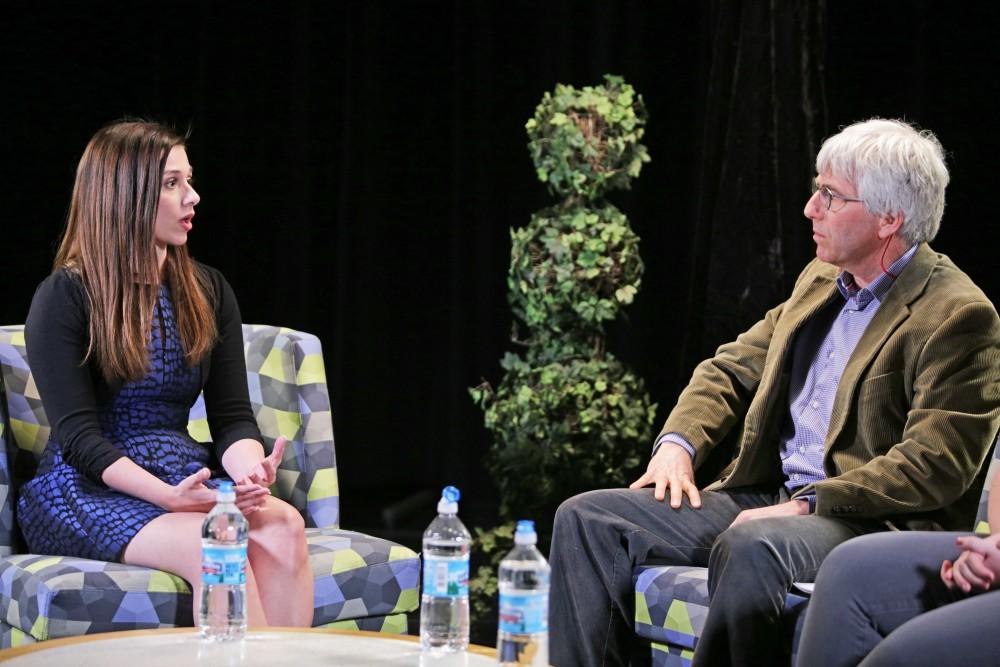‘You have given so many women their lives back’

GVL / Emily Frye
Marisa Kwiatkowski talks about the role she played in breaking the Larry Nassar sexual abuse scandal on Monday, March 26, 2018.
Mar 30, 2018
The USA Gymnastics scandal has sent shock waves through the sporting world in recent months. A highly publicized trial culminated in former USAG and Michigan State University doctor Larry Nassar being sentenced to up to 175 years in prison for sexual abuse in January.
Nassar’s atrocities came to light after an Indianapolis Star report surfaced detailing USAG’s policies of undermining sexual assault victims. Marisa Kwiatkoswki, a Grand Valley State Univeristy alumna, was among the lead reporters.
On Monday, March 26, Kwiatkowski returned to GVSU to participate in a Q&A session. The event took place in the DeVos Center Loosemore Auditorium and was moderated by GVSU multimedia journalism professor Jeff Kelly Lowenstein. The session allowed Kwiatkowski to share her experience, from getting the first tip on USAG to watching the impact statements at Nassar’s trial.
The event was similar to an earlier session held on GVSU’s Allendale Campus.
Kwiatkowski graduated from GVSU in 2005. From there, she worked at the Grand Haven Tribune and The Times of Northwest Indiana before joining IndyStar.
Kwiatkowski discussed how after a tip, the investigation began with a policy held by USAG.
“There were pieces that were from current and former USA Gymnastics officials that talked about their policy for handling sexual abuse allegations,” she said. “What that showed was that they had a policy of dismissing allegations as hearsay unless they had been signed by a victim, a victim’s parent or an eyewitness to the abuse.”
Kwiatkowski also described how Nassar was able to create an image as a respected gymnastics doctor by manipulating those around him.
“When we started our investigation into Larry Nassar, he was running for school board at the time,” Kwiatkowski said. “He was this beloved figure in the sport of gymnastics. He was well-known, well-respected. … He was a prominent figure.
“Larry Nassar groomed not only the people directly around him, but his environment.”
In a competitive culture such as the one found in gymnastics, coaches are often extremely demanding of their athletes, pushing them as far as they can go. Nassar presented himself as the antithesis to this, being a calmer presence for young athletes desiring to reach the pinnacle of their sport.
“He positioned himself as the foremost expert in pelvic floor methodology, he would present at conferences, he wrote a textbook chapter, he would talk a lot about the work that he was doing,” Kwiatkowski said. “And at the same time, in the sport of gymnastics, when you’re trying to achieve at the highest level, a lot of times your coach is pushing you and really trying to get you to that next level. He was the counterpart to that; he was the nice guy.
“He was the guy that would sneak them candy. He would give them little gifts and encourage them, be their confidant, and at the same time, he’s also doing the same thing with the parents.”
Kwiatkowski explained that Nassar presented himself as a friend to most parents, being able to go the extra mile to give them what they or their child needed.
“He, for a lot of parents was this great guy who would go out their way to help them,” she said. “If they had a busy schedule, he was the one saying, ‘Hey, I’ll meet you after hours, no big deal,’ or ‘Hey, I can stop by and do that at your location instead of making you come to me.’
“He really positioned himself in such a way that when any of these allegations would come out, and they did come out numerous times over these decades, people either didn’t believe the people who came forward, they dismissed them, or they discouraged people from moving forward and reporting their claims.”
The IndyStar report played a large role in helping survivors of Nassar’s abuse come forward. One survivor, Sterling Riethman, was in attendance at the event. She thanked Kwiatkowski for her work, saying that it inspired many to come forward.
“The IndyStar article, when that came out, I don’t know if there’s an understanding, but that article, I relate it to the shot heard ’round the world in the women’s athletics community,” Riethman said. “I don’t know if you fully understand the gravity of that, but when you sat in that courtroom and listened to the 156 impact statements that were delivered, I would say 90 percent of them at some point referenced ‘my whole world changed when I saw that IndyStar article.'”
Riethman, as well as a mother of another survivor, and Stephen Drew, an attorney who represented more than 100 survivors, spoke after the Q&A.
“You have given so many women their lives back,” Riethman said. “I hope you understand that.”
The Marisa Kwiatkowski event was part of the GVSU School of Communications’ Robert Mayberry Comm-Unity series. The series was created to honor Mayberry, a former GVSU professor, who passed away in December at the age of 89.

























